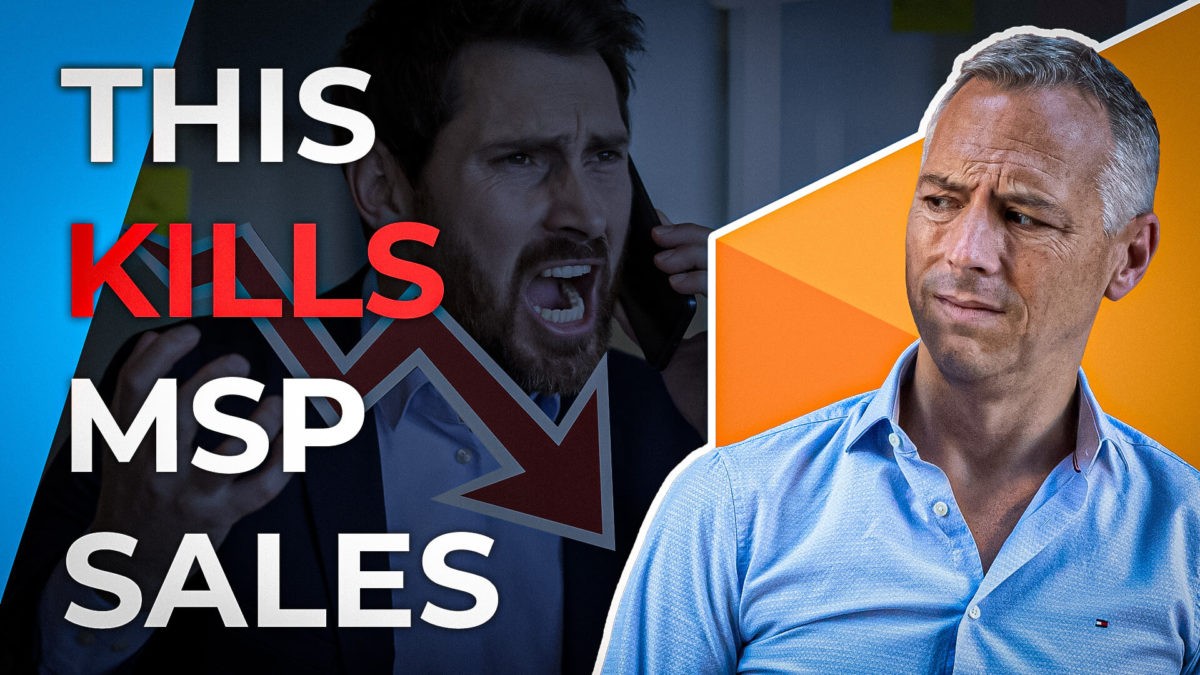
The podcast powered by the MSP Marketing Edge
Welcome to Episode 256 of the MSP Marketing Podcast with me, Paul Green. This week…
- Warning! This friction kills MSPs’ sales: When you have someone making contact with you, your job is to make sure you’ve removed every single piece of friction from the sales process.
- Can your MSP’s technicians close this many tickets?: I interviewed the awesome Jason Kemsley from Uptime Solutions, an outsourced help desk, who gave us the stats to assess what good performance looks like for all three levels of technician.
- How MSPs manage the conflict of business and parenting: My guest, David Ask, tells you how to live a great life, while still achieving everything you want with your business.
- Paul’s Personal Peer Group: Chris from San Francisco wants advice on a good meeting structure to grow his MSP.
Warning! This friction kills MSPs’ sales
As an MSP, you’re hardly inundated with calls from people who want to buy from you. Well, that’s my experience of the MSPs that I work with, certainly. So when you do have someone making contact with you, your job is to make sure you’ve removed every single piece of friction from the sales process. Let me tell you about my experience of the exact opposite of this, where I was desperate to buy something and the friction in doing so was so great, it drove me into the arms of a competitor.
So I’m not going to name the company that I was trying to buy from as that’s not really fair on a podcast and YouTube video like this, just know that it’s not an MSP and it’s not a company in the channel, but it is a supplier of marketing services based in the US. I’ve been doing some research recently into a new marketing initiative that we are doing to promote the MSP Marketing Edge and this service was the perfect solution.
I’d managed to answer all of my questions online, on their website, which is actually the first piece of friction that you and I need to talk about. If an ordinary business owner or manager goes onto your website, will you answer as many of their questions as you can? I’ll be honest, for most MSPs, the answer to this is sadly no.
Most MSPs don’t have the basics in place, such as explaining what you do, how you do it, what makes you different from the other IT companies they’re looking at. And most importantly, you probably don’t have an indicative idea of pricing on your website.
Now, I know that this is a very emotive subject because the price depends upon how long the string is. But when it comes to websites, I very much follow the advice of Marcus Sheridan. In his book, They Ask, You Answer, which definitively says you should put prices on your website because it’s one of the most basic things that people are looking at.
Anyway, I digress. So I answered all of my own questions on this potential supplier’s website and I was ready to buy, and that was where I ran into real trouble because it really wasn’t obvious how to buy from them. There was a call to action button, so the thing that they wanted me to do, and that took me through to a page, which did actually talk about their pricing and their packaging or their packages, but you couldn’t actually select one of the packages and go through with the purchase, which was really weird.
So I thought perhaps the website was having some kind of blip. I refreshed it, I left it for 24 hours and I came back the next day, but nothing had changed. It was exactly the same. Here’s the thing, sometimes what seems obvious to us, what seems obvious that we want them to do, is not obvious to every other human on the planet.
So I clicked on the live chat button, but it was out of hours with the time zone that they were based in, and there was no option for me to leave a message on live chat for them to reply to. So I looked up their email address and I sent them an email and 48 hours later, and yes, this was during the week, this wasn’t the weekend. 48 hours later, I still hadn’t heard anything, which was nuts. It was kind of like they didn’t want the business. So I sent another email chasing my original email, and this time I did get a reply about three hours later and you won’t believe what the reply was. They asked me to book a video call with them, a zoom with them. They sent through a live calendar and said that the only way to buy from them was to actually have a meeting.

Now, I completely understand the need to qualify buyers and check that they’re the right kind of buyers for you, but we are not talking about something like managed services here where you may only take on one or maybe two new clients a month at the most, so you want to pre-qualify them and then make sure they’re right for you. This was a service that should be taking on two to three new clients a day and then to add insult to injury. They had no availability in their live calendar for the next two weeks.
Anyway, let me cut to the end of this story. I did eventually manage to book a call for the following week after I’d gone back to them and we’d done a bit of back and forthing over availability, and then I’ve realised, oh, I’ve got another week. I’ve got to sit for a week. And I started to get a bit annoyed about the lack of progress because the lack of progress in buying from this supplier was holding back the whole marketing initiative and it’s a marketing initiative that I’m driving and I try to make myself accountable to my own team for anything that I’m working on, which I think as the boss you have to do. It’s much better for productivity when you’re accountable to someone, even if that’s your own team.
I didn’t want to have to tell my team that I’d failed again and this project was going to have to be pushed back another couple of weeks. So I just started Googling and I actually just typed in alternatives to this service and guess what happened? 30 minutes later, I’d done some research, I’d found a competitor that looked similar, not as perfect a match as the one I was going to buy from, but I got my questions answered. I looked at the price, I pressed the button, I entered my card details, and I was a client.
Do you know what’s really weird… no one from the original supplier that I picked, no one followed me up when I cancelled the live meeting. And remember, we’ve had email conversations, I’ve asked them to free up some availability, and then I cancelled that meeting without giving them a reason why, and they never asked why. This is crazy.
Now, I appreciate that this is perhaps an outlier example, but the amount of friction that was there in that buying experience was nuts. And it’s a great reminder to you to figure out if there’s any friction in your buying experience. For example, can someone book a 15 minute meeting with you in the next 24 hours? Is your live calendar on the website? Do you answer all possible questions or maybe even have a live chat that’s manned 24 hours a day because you use an outsourced service? As we asked earlier, do you have prices on your website? Here’s a good one. If I phoned your MSP today, would the person who answered the phone be able to answer my sales questions immediately? Would I find myself frustrated by being passed around on the phone or being told that someone, you I guess, is going to call me back at some point?
Let me make this as clear as I can for you, so you put urgency and priority on this. Any friction in sales will put off new clients and they will go and look elsewhere. It’s a priority for you as the owner or manager of the MSP to make sure the process of vetting you and picking you is as easy for prospects as it can possibly be.
Can your MSP’s technicians close this many tickets?
One of the hardest things about running your own MSP is that it’s too easy to feel your operating in a silo, in a little bubble cut-off from everyone else. The hell of staff, marketing, finances and everything else that we have to deal with single handedly is what can make us business owners feel really lonely. And this is weird, but it’s also perfectly normal. And actually MSPs have some of the greatest support communities I’ve ever seen, such as the tech tribe and my MSP Marketing Facebook group.
The good news is you are not alone, which means virtually every challenge that you have to deal with, there’s someone out there with guidance.
Now, let’s take your technicians. Have you ever wondered how efficient are they? Last year I interviewed the awesome Jason Kemsley from Uptime Solutions, an outsourced help desk. At that point, they had 37 help desk staff handling 3000 tickets a month on behalf of 180 MSPs, which sounds like a big headache to me, and I’m sure those numbers are much, much larger today. But it does mean that Jason and his team are able to assess what good performance looks like for all three levels of technician.

They also know what extra ticket load every extra user brings to them. And because they’re growing so fast, they need this information, it’s critical to help them recruit ahead of demand. So here are the stats that Jason told me, and you can compare them to your technicians:
First line technicians should be able to handle between 10 and 14 tickets a day, and if they’re not achieving this, it probably means that they’re not bought into your MSP’s culture, or their base knowledge just isn’t there.
Second line technicians should be able to handle eight to 12 tickets a day. Now this includes escalations that may have happened too quickly.
Third line technicians should be able to handle somewhere between none and four tickets a day. Why none? Well, third line techs can potentially deal with such complicated issues that there are days where they don’t complete a ticket. It’s taken perhaps two or three days to resolve.
Now let’s have a look at ticket burden from clients. Jason told me that the average client submits 1.4 tickets per person, or per user per month. Did you write all of those down? If you didn’t wind it back, go and write them down because you now have all the stats you need to assess the efficiency of your team and also whether your clients are creating more noise than the average client should be.
How MSPs manage the conflict of business and parenting

Featured guest: David Ask, a successful entrepreneur whose product, the StatGuardPlus.com, is now available in over 3700 retail stores, including giants like The Home Depot, Lowe’s and True Value Hardware.
David also leads two mastermind groups with the elite ISI Mastermind. Alongside this, he collaborates closely with Dr. Andy Garrett as the Lead Coach for the transformative True North Resiliency program. David believes that understanding ‘WHO’ you are, on a very granular level, is the key to understanding ‘WHY’ you do what you do…. It is a shift that is life-changing. He often says, “Never start with WHY, start with WHO.”
He is currently writing a book titled, “The Guardians of Grit,” which aims to empower fathers in raising uncrushable young people. Grounded in a science-based approach that distinguishes between Grit and Resilience, David’s book explores how this knowledge can fundamentally shape one’s core identity.
There’s an inherent conflict between being a successful business owner and also a supportive parent and partner. Anyone who’s ever run their own business will understand this, and it’s especially hard in your first few years when you’re working more hours than you’ve ever worked before for less money than you’ve ever earned. It’s a very traumatic and highly emotional time, and my guest today helps lead business owners just like you through these kind of problems.
Today’s guest will not only tell you how to live a great life while still achieving everything you want with your business, he’s also, a bit random, but he’s also a great singer and he’s got a little tune lined up for us at the end of today’s interview.
Hey, my name is David Ask and I live in Nashville, Tennessee, and I might be the best encourager in the world.
Oh, what a great introduction. And not only do you have a great intro, a self intro for this podcast, but as a little tease for what’s coming up in the next eight minutes or so. David, you about to become the first ever guest in nearly five years of this podcast who sings on the podcast. That’s coming up in the next eight minutes. It’s worth waiting for. It really is. So thank you very much for coming on, David. We are going to talk about an amazing subject today. How do you live an amazing life and still grow the business of your dreams? That’s what we’re going to talk about. Let’s first of all, find out who you are.
Man. Thank you so much for having me. What an honour. And yeah, it’s interesting you mentioned the music. I was actually a vocal major at Belmont University here in Nashville back in the early nineties and even now I do a lot of music along with running my main business as it were – I’m an inventor and kind of product developer, so I have a product. My mainstay is a product that’s in 3,700 retail stores and it’s a first in the world, a thermostat guard that has a combination lock. So, you prevent tampering of thermostats by just simply putting a box on it, and I solved the lost key problem.
I love that. So it stops someone else from just going in and fiddling with it and changing it.
Exactly. Yeah, it can get pretty costly. And of course, I mean it’s the old thermostat wars. People kind of understand that whether it’s your home or office, everybody kind of wants a different temperature, so it can solve that problem as well.
I love that. So just as a side note, I have a 14-year-old daughter, so if you could come up with a refrigerator lock, a food cupboard lock, an everything lock. Something that turns off the WIFI for her, but not for me at about 10 at night. That would be amazing. It really would.
So, I know you spend your days inspiring business owners as well and talking to them about how they can improve their lives and their businesses. And it is the conundrum and anyone who’s been in business for more than a couple of years reaches that point. And I remember doing this myself. I’ve been in business since 2005 and I remember about 2008, 2009, still doing 60 hour weeks. My relationship with my wife at the time was suffering and it was a really, really difficult thing. I think every business owner goes through this where you realise that these are two completely conflicting things. To grow a business requires your time and your attention and to keep a relationship healthy and especially when you’ve got kids, requires your time and your attention. But also you need to sleep and exercise and eat and not drink too much and all of that stuff. And these two things are kind of bashing completely. Is this just me and some of the business owners I talked to or is this something that most business owners go through?
I don’t think there’s any question that if you’re going to do something like start a small business, bring a product or service, to market that so people not only value but know about it, the old marketing piece, it’s going to take sacrifice. And people often use that phrase work-life balance, and I don’t like that. I think that this idea of work-life integration is really the actualisation of it. I think balance in some ways it’s desired. We think, yeah, we would like some balance. I want to have a certain number of hours at home and at work and things like that and for sleeping, like you mentioned, but guess what, on the front end of any great endeavour as it were, there’s going to be some things that are maybe wildly out of balance for a while. And I think that’s okay. I think that’s normal. It’s like if I’m going to climb a mountain, well guess what… I’m going to be preparing well in advance for that climb as it were by spending a lot of hours not only investigating the equipment that I need, getting out in the field and using it and figuring out what works and what doesn’t. And so I think that there’s definitely some wild swings on the front end for sure.
Yeah, absolutely. And I have to say, I’ve worked with lots of different businesses over my career. I’ve been working with MSPs since 2016, and I do think MSP owners have it even harder than other business owners because the very nature of being an MSP is you don’t know what’s going to happen. You can come in on a regular Tuesday morning and the whole world could have gone mad. An update could have gone wrong overnight or you could have had a ransomware attack on one of your client’s computers and suddenly everything you plan to do that day by necessity has to go. And that happens to MSPs even when they’ve got 5, 10, 15, 20 staff. So let’s talk more about what you mean by integration. So I think we’re all comfortable with work-life balance, but what do you mean by work-life integration? Is that about making sure that the two of them are coming together in the right way or does it mean something different?
I guess the way I kind of internalise that is just this idea of who’s showing up, meaning. Meaning if I’m going to participate or say that I value certain things in my life, I’ve had to have done a little bit of pre-work as it were to understand what are those things that are on that list? You can’t be everything to everybody. I mean you can’t participate in everything, all that kind of stuff. So you have to have kind of a hierarchy of these are the things that I think are really important right now and be willing to say no to some stuff even for a while. And at the same time, I think that we often, those of us who are kind of entrepreneurial minded, we get this idea that the business is everything, and I’ll show some grace here. I think in some level for a short time it might be because money, I heard somebody say money is kind of close to air, try to live without it. It’s really important.
At the same time, we’ve got our families; the people that we love, and we sure don’t want to send the message to those closest to us that you don’t matter right now.
So I think largely it’s expectations and communication on the front end. I remember when I was starting my business about 10 years ago, I didn’t really realise that I should have communicated to Lisa and my kids for that matter, Hey, I’m going to have to spend a bit more time on this today or the next three days, or guess what, I’m having to work this weekend on something or things like that. So I think I learned maybe the hard way on the front end about even just communicating what that looks like and the communication, by the way, goes a long way.
Yeah, I think it really does. And I guess that’s when you take your life partner and your kids and your friends and everything else, and as you say, using that communication, you form a partnership with them. I have a similar thing with my daughter. So I’m a sole parent. There’s just me and her here, and as much as I joke about her raiding the refrigerator, actually we have a great partnership. So for example, you and I are recording this. I’ll just check my clock. It’s quarter past seven in the evening on a Monday evening in the school summer holidays back in August. We work a few months ahead on the podcast, but she’s really happy with me doing this because actually she’s in her room, she’s doing some stuff. This is a regular thing and she knows that the flip side of some days I work late doing podcast interviews, but the flip side of that is tomorrow we’re going to London all day. We’re seeing two shows, two theatre shows tomorrow.
So it swings and roundabouts and I get a great podcast, which is important to me and she gets a great day. Let me ask you a question about that. A lot of business owners struggle with that balance, that integration, because there’s just too much to do. So I’m in a lucky position where I’ve got a great team, they do the heavy lifting, I just talk a bit on camera. Someone else does all the other hard work, but there are many MSP owners who are not in that position because actually if they don’t do 10 hours of work today and 10 hours tomorrow, and you know what, I’ve got to get up at six on Saturday, then actually as we were saying, money’s important and the clients stop paying because the work’s not getting done. How do you advise people to break out of that trap without just throwing more hours into it?
Well, I think that like anything, you better count the cost of starting a business before you start the business. Meaning if you don’t have a bit of an exit strategy from that head down mentality and rhythm in your life, that can get really old really fast, even if the money starts pouring in, money only goes so far I think. You can’t sustain that level of effort, really. It’s not a life you become a human doing and not a human being. And so I think that largely on the front end, you need to define what are the steps necessary to build a business that I don’t have to serve it but that serves me. Again on the front end. I get it right. You might have a year or two where you’re really head down going for it, but I would say that if you are in that situation right now and you don’t know what your exit strategy is, and I’m not talking about selling your business, I’m talking about getting out of the day-to-day and into the driver’s seat working on your business and not in it, you need to surround yourself with some people who can help you manage those steps because you’re going to get burned out really, really quickly.

Yeah, I completely agree. So let me ask you this then, David. What do you do to help business owners free themselves from this trap? That’s really what it is.
I do a couple of different things. So I’m a coach, but I do it from a values based perspective, meaning we really help the person build self-awareness. What are my values, my convictions, my virtues? Those are different things. And quite often when we don’t have clarity on those things that really light us up, I’m talking everything from what gives our goosebumps goosebumps, to what do I believe is true about me and everybody around me and how can I affect the world. So that self-awareness piece is huge. I’m also a part of the Iron Sharpens Iron Mastermind and I facilitate two groups within that mastermind of business owners. And so of course as a collective, we’ve got a virtual board of directors for our business, and we talk about personal things as well. We call it a band of brothers for our personal lives, and we become like the people we spend the most time with, period. And how do we know that’s true like gravity? It’s because those of us who have children, we do not want our kids getting caught up in the wrong crowd, period. We know that instinctively, but we don’t often think about that for ourselves. So the coaching piece is one side of my life that I’m really passionate about. And then the masterminding is another that’s been life changing for me as well.
Yeah, a hundred percent. I’m a massive fan of mastermind groups. I’ve run some previously in the UK for MSPs. I don’t do that anymore. It’s not something I personally enjoy facilitating. I enjoyed it for a few years and then once it stopped being fun, I stopped doing it, which I think is a sensible way to run any kind of business. But the concept of it, of you sitting with other people with exactly the same problems as you and you figuring it out. And I love that approach of the values-based thing. If I think of my values of being a great dad, the best possible dad is a very strong value, but also being a successful business owner is also a strong value. I can see how many people would feel exactly the same way and mastermind groups help those two things integrate as we were talking about earlier. Okay. David, just briefly before you sing, and we are going to get a few notes out of you, just tell us how can we get in touch with you and learn more about what you do?
Sure. So my main business, if you go to stat guard plus.com, you can check out my thermostat guard line and as well my personal page is DavidAsk.com.
Okay. And for the first time since the 5th of November, 2019 when we launched this podcast thinking it was going to be a 10 week experiment, and here we are nearly five years later, I can do a drum roll (maybe our producer Simon can insert a drum roll at this point). There we go. David, would you like to prove to us that you are also not just a great guest, but a great singer as well?
Hey, by the way, before I do that, I recorded my last record in England. The producer is British. He has a home here in Nashville.
Hang on a second. You are in one of the greatest musical towns in the world, which is Nashville, and you came to England to record a record that doesn’t.
I know. Isn’t that funny? That’s crazy. All right. I’m going to actually sing something that I don’t think I’ve ever sung, but I heard it this morning. My daughter was playing it, so I’m going to just give it a try here. Somewhere over the rainbow up, way up high. All right, how about that?
There we go. Very good. Thank you very much. And you helped us immensely by picking an out of copyright piece of music as well. So thank you very much, David. Here we go. Thanks for being on the show.
Hey, my pleasure. Thanks for having me.
Paul’s Personal Peer Group
This week’s question is from Chris whose MSP is fairly new in San Francisco. He has a small but growing team and his question is in terms of meetings – What’s a good meeting rhythm to grow the business?
A meeting rhythm helps to take away the haphazard nature of growing the business. If you have a management team you work with, you need to figure out how often you should meet and why. I’ve got to be honest, less is definitely better than more. Here’s a good structure that you can start with, and of course you can take this, try it out and adapt it to suit you and your team.
So I think once a year you should have two days offsite away somewhere, stay over in a nice hotel and that’s time to bond. It’s time to think big and to set the vision for the next few years. Then once a month, you should have a formal management meeting, ideally physically meeting up and no more than a couple of hours. The agenda should be a hundred percent on subjects that grow the business. And then once a week, you should have a short video call with a progress update on the actions from the management meetings and make this the same day each week. Mondays are good as they can set up the whole week’s work. And then finally, you’ve got operations meetings, and these should be as needed perhaps to discuss technical issues and clients. If you do them once a week, make sure that they’re on a different day to those growth calls that you are doing. Otherwise, they’ll just merge into each other and the growth meeting will become less effective. A quick side note on this, if you’ve never read it, Traction is a really great book to read around this subject.
Mentioned links
- This podcast is in conjunction with the MSP Marketing Edge, the world’s leading white label content marketing and growth training subscription.
- Join me in MSP Marketing Facebook group.
- Connect with me on LinkedIn.
- Connect with my guest David Ask on LinkedIn and check out his website.
- Mentioned books: They Ask, You Answer by Marcus Sheridan, Traction by Gino Wickman.
- Got a question about your MSP’s marketing? Submit one here for Paul’s Personal Peer Group.
